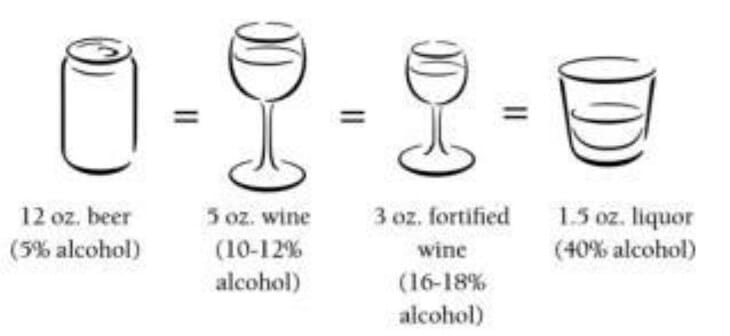Canada’s Low-Risk Alcohol Drinking Guidelines have been updated. Click here to see the latest 2023 guidance.
As you age, you become more sensitive to the effects of alcohol, and your body processes alcohol more slowly. This means that drinking the same amount as when you were younger has a greater effect. It also means that you are more vulnerable to the negative effects of alcohol. These negative effects include:
- loss of strength in your muscles and loss of balance and co-ordination, increasing the risk of injuries due to falls
- worsening of some health issues, such as liver damage, diabetes, heart or blood pressure and stomach problems
- causing or worsening of some mental health problems such as confusion, memory loss and depression
- interactions with medications. Some medications don’t work as well when taken with alcohol; others intensify alcohol’s effects, making you more prone to falls. Many medications should not be taken with alcohol.
Much has been said about the health benefits of drinking alcohol. The most recent research, however, indicates that even low average daily alcohol consumption is a risk factor for many types of cardiovascular disease. If you don’t already drink, don’t start for health reasons.
What are the signs of alcohol problems?
Many older adults drink alcohol without problems. When problems do develop, they may begin at a young age or later in life, such as when a person has difficulty coping with retirement or the death of a loved one.
Older adults who feel they cannot stop drinking, even when alcohol causes problems in their lives, may be alcohol dependent (also called addiction). If people who are alcohol dependent suddenly stop drinking, they may experience withdrawal. Alcohol withdrawal can make a person seriously ill, and should be supervised by a medical professional.
Signs of problems include:
- loss of co-ordination, falls, slurred speech
- problems sleeping
- poor personal care, such as not bathing, not eating (or not eating well) or not taking care of health problems
- irritability, depression or confusion
- stomach problems, lack of desire to eat
- making excuses or making up stories to cover up the truth about drinking
- tension in relationships, losing touch with friends or family
- lack of interest in usual activities, desire to stay alone a lot of the time
- signs of alcohol withdrawal, such as racing pulse, tremors and agitation.
Some of the signs of alcohol use problems are the same as the signs of medication use problems. If you notice these signs in someone you know, suggest the person talk to his or her doctor about the problems he or she is having.
Long-term alcohol problems can affect the body’s ability to absorb nutrients, and put the person at increased risk of certain brain conditions, including alcohol-related dementia, pseudo-Parkinsonism (trembling, etc.) and peripheral neuropathy (tingling or numbness in the hands and feet).
What can I do to avoid problems with alcohol?
While the easiest way to avoid problems with alcohol is to not drink at all, many people enjoy alcohol and choose to continue drinking as they get older. If you drink, the following guidelines can be used to help keep your drinking at a level that is considered low risk.
- drink no more than two standard drinks in a day
- have water or juice between drinks
- wait at least an hour between drinks
- on some days don’t drink at all.
Note that the following “standard” drinks contain the same amount of alcohol:

If you think you have an alcohol problem . . .
Ask yourself the following questions:
- Have you ever thought you should CUT DOWN on your drinking?
- Have you ever felt ANNOYED by others’ criticism of your drinking?
- Have you ever felt GUILTY about your drinking?
- Do you have a morning EYE-OPENER?
If you answered yes to one or more of these questions, talk to your doctor or an addiction professional to help you decide whether you might benefit from treatment or other support.
It can be hard to make this first step, but you are not alone. Older people who get professional help for their drinking problems are often able to cut down or quit drinking, and stick to these changes, even more successfully than younger adults. Help is available. Even if you have tried treatments or other supports before, it is always worth trying again.
Where can I get help for an alcohol problem?
- Contact the Drug and Alcohol Registry of Treatment (DART) at 1 800 565-8603 or online at www.dart.on.ca for information and referral to alcohol and other drug treatment services in Ontario. This free and confidential service is open 24 hours a day, seven days a week. Specialized treatment services for older people are available in some communities.
- Contact Access CAMH for: mental illness including addictions information, eligibility requirements and instructions on making a referral to CAMH and to refer yourself for addictions services. For Access CAMH Services, call 416 535-8501, option 2.
Adapted from What older adults, their families and friends need to know about… Alcohol © CAMH 2008